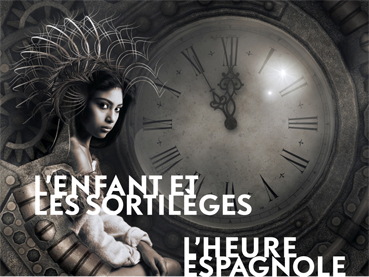MAURICE RAVEL
L'Enfant et les Sortilèges &
L'Heure espagnole
Sunday, October 20, 2019— 2:30pm
in English
Alluring and magical, an enchanted world leads a young child to a vision of our shared humanity, while defective grandfather clocks teach their own lessons reflecting the comedic frustrations of life.
Featuring
Suzy Smith, Music Director and Pianist
Robert Cooper, Chorus Director
Danlie Rae Acebuque
Holly Chaplin
Joshua Clemenger
Diana Di Mauro
Anika-France Forget
Edward Larocque
Kyle Merrithew
Meghan Symon
SYNOPSIS
L'Enfant et les Sortilèges
This is the story of a rude child who is reprimanded by the objects in his room, which he has been destroying. After being scolded by his mother in the beginning of the opera, the child throws a tantrum, destroying the room around him and harming the animals nearby. He is then surprised to find that the unhappy objects in his room come to life. The furniture and decorations begin to talk; even his homework takes shape as it becomes an old man and a chorus of numbers. They all sing out the pain and misery that the child inflicts on them and their wishes to punish him for his misdeeds.
The bedroom becomes a garden filled with singing animals and plants which have been tortured by the child. The child attempts to make friends with the animals and plants, but they shun him because of the injuries he did to them earlier, before they could talk. They leave him aside, and in his loneliness, he eventually cries out "Maman". At this, the animals turn on him and attack him in an act of vengeance, but they wind up jostling among each other as the child is tossed aside. At the culmination, a squirrel is hurt, which causes the other animals to stop fighting. The child bandages the squirrel's wound and collapses exhausted. Seeing this act of kindness, the animals have a change of heart toward the child, and decide to try to help him home. They mimic the cry of "Maman", carry the child back to his house, and sing in praise of the child. The opera ends with the child singing "Maman", as he greets his mother, in the very last bar of the score.
L'Heure espagnole
Time: 18th century
Place: The workshop of the clockmaker Torquemada in Toledo, Spain.
Torquemada is at work in his shop when the muleteer Ramiro stops by to have his watch fixed, so that he can fulfill his duties at collecting the town's post. It is Thursday, the day that Torquemada goes out to tend the municipal clocks, so Ramiro must wait. Torquemada's wife, Concepción, enters to complain that her husband hasn't yet moved a clock into her bedroom. After Torquemada has left, she takes advantage of his absence to plan assignations with gentleman friends. However, the presence of Ramiro is initially a hindrance. So she asks him to move a grandfather clock to her bedroom, which he agrees to do.
Meanwhile, she waits for Gonzalve, a poet. He arrives, and is inspired to poetry, but not to lovemaking, where Concepción would prefer the latter. When Ramiro is about to return, she sends him back saying that she chose the wrong clock. She then has the idea of having Gonzalve hide in one clock so that Ramiro can carry him upstairs. After Gonzalve is concealed, Don Iñigo, a banker and another of Concepción's gentleman friends, arrives. When Ramiro returns, she persuades him to carry up the clock with Gonzalve concealed in it, and she accompanies him.
On his own, Don Iñigo conceals himself in another clock. Ramiro enters, asked to watch the shop, and musing on how little he understands of women. Concepción then summons him back upstairs, saying that the clock's hands are running backwards. She and Don Iñigo try to communicate, but Ramiro arrives back with the other clock. Don Iñigo has hidden himself again, and Ramiro now carries up the clock with Don Iñigo upstairs.
With Gonzalve now downstairs, Concepción tries to turn him away from poetry towards her, but Gonzalve is too absorbed to follow her lead. Ramiro returns, and Gonzalve must conceal himself again. He offers to take the second clock up again. Impressed by how easily Ramiro carries the clocks (and their load) upstairs, Concepción begins to be physically attracted to him.
With Gonzalve and Don Iñigo now each stuck in clocks, Torquemada returns from his municipal duties. Both Gonzalve and Don Inigo eventually escape their respective clock enclosures, the latter with more difficulty. To save face, they each have to purchase a clock. Concepción is now left without a clock, but she muses that she can wait for the muleteer to appear regularly with his watch repaired. The opera ends with a quintet finale, as the singers step out of character to intone the moral of the tale, paraphrasing Boccaccio
|




